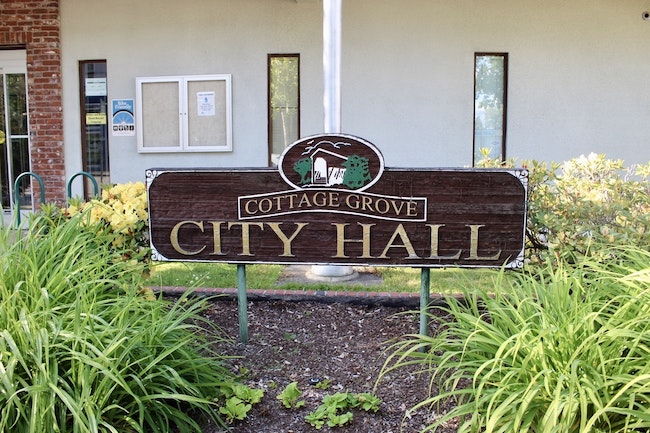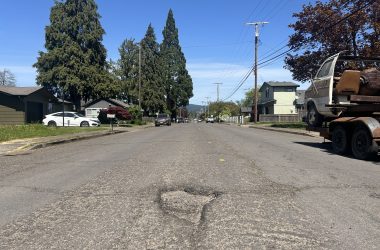COTTAGE GROVE – Councilors Mike Fleck, Chalice Savage, and Jon Stinnett may be up for recall in a special election this winter, which, if pushed through, could cost taxpayers over $15,000.
Anyone who is a registered voter in the district where the public officer was elected or appointed can go through the 11-step prospective recall petition (PRP) process laid out in Oregon’s Secretary of State’s recall manual, but city manager Richard Meyers said this doesn’t happen often; in fact, he has never seen it happen in his 26 years in office in Cottage Grove.

The SEL 350 form that community member Michael Borke submitted on July 20 stated that this trio of councilors has not served the taxpayers of Cottage Grove in their best interests.
Fleck said he is “really, really disappointed,” but he doesn’t have any other comment at the moment.
Borke said he filed the PRPs because the city council has not acted on any issue he has discussed during public forums throughout the last year; he was particularly concerned with how the City has managed the houseless crisis.
“Jon Stinnett is in Ward 2, where I live. He has two homeless camps in that ward that he has approved…” Borke said. “(Savage and Fleck) are proponents of it. A town our size cannot support the population that we’re fast becoming… Who’s going to sustain that cost?”
Stinnett declined to comment on the PRPs.
Borke is on step six of the process, which includes circulating and gathering signatures. He has a strict timeline he must follow.
He must submit 654 signatures – 15% of the votes from the last gubernatorial election, which was 4,356 votes – for each councilor no later than the 90th day after they were filed, which was July 25. Borke must submit these signatures to city recorder and elections official Mindy Roberts by Oct. 23 at 5 p.m..
If Borke is unable to collect the signatures before the deadline has passed, the PRPs cannot move forward.
If enough signatures are gathered and filed on time, Roberts would then verify the signatures by Nov. 22 at the latest. Roberts would then inform the public officials to move to step 10, which requires them to submit either a resignation or a statement of justification within five days after Roberts files that the PRPs contain sufficient signatures, which should be by Nov. 27.
The special election is step 11, which, per the recall manual, “must be held no later than the 35th day after the last day for the public officer to resign.” The special election would need to be held by Jan. 1, 2024.
The recall manual states, “The public officer continues to perform the duties of the office until the result of the election is officially declared by the election official, which must be no later than 35 days after the election is held.” If there is a special election, the results would be available by Feb. 5, 2024.
Meyers said PRPs can be rejected, though, because if they aren’t based on facts, they are not valid PRPs. But he said there is a level of “mushiness” to what is considered fact and what is considered fiction.
The SEL 350 form, the one Borke completed in step one, states: “Supplying false information on this form may result in conviction of a felony with a fine of up to $125,000 and/or prison for up to 5 years,” and “By signing this document, I hereby state that any factual information (not a matter of opinion) in the above statement is true.”
Meyers said fines and imprisonment are not being considered. If the statements are proven to be illegitimate, the PRPs would just be rejected.
“This is not something that you see regularly, and it’s set up in the state constitution, in the state statutes specifically, to handle issues, challenges, and problems that come up. It’s not meant to be a forum for people to argue an issue back-and-forth just because somebody doesn’t agree with someone,” Meyers said. “But that’s local government, and in government, there’s going to be disagreements. There’s opinions; there’s views. (But the issue) needs to be of a magnitude that warrants that kind of approach. That’s why it’s a serious thing and why it has a pretty detailed process that has to be followed to go through.”
A PRP can be filed for a public office holder, other than a state senator or representative, only after the public officer has served at least six months of their current term in office. Recalling an elected official would remove them from office through a direct vote – in this case, a special election.
According to Savage, Cottage Grove’s last special election was in 2012, and it cost the taxpayers $12,000, not including the cost of printing and mailing out ballots. Given inflation, this special election could cost over $15,000.
“Ultimately, what it comes down to is the taxpayers are who pays for this,” Savage said. “It’s discouraging to think that one person can cost the city so much money.”
Borke said he hopes the special election happens.
“The preferred outcome is to get people who actually represent the residents of the town (in office),” Borke said.
Savage encourages folks to do their research before signing the PRPs.
“This recall is driven by emotions and not any egregious behaviors,” Savage said. “(Councilors) have an amazing opportunity to be voices for Cottage Grove at many different levels, and it would be in the interest of the citizens to keep those positions established.”







